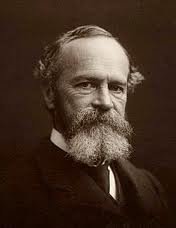
William James was an original thinker in and between the disciplines of physiology, psychology and philosophy. His twelve-hundred page masterwork, The Principles of Psychology (1890), is a rich blend of physiology, psychology, philosophy, and personal reflection that has given us such ideas as “the stream of thought” and the baby’s impression of the world “as one great blooming, buzzing confusion” (PP 462). It contains seeds of pragmatism and phenomenology, and influenced generations of thinkers in Europe and America, including Edmund Husserl, Bertrand Russell, John Dewey, and Ludwig Wittgenstein. James studied at Harvard’s Lawrence Scientific School and the School of Medicine, but his writings were from the outset as much philosophical as scientific. “Some Remarks on Spencer’s Notion of Mind as Correspondence” (1878) and “The Sentiment of Rationality” (1879, 1882) presage his future pragmatism and pluralism, and contain the first statements of his view that philosophical theories are reflections of a philosopher’s temperament.
James hints at his religious concerns in his earliest essays and in The Principles, but they become more explicit in The Will to Believe and Other Essays in Popular Philosophy (1897), Human Immortality: Two Supposed Objections to the Doctrine (1898), The Varieties of Religious Experience (1902) and A Pluralistic Universe (1909). James oscillated between thinking that a “study in human nature” such as Varieties could contribute to a “Science of Religion” and the belief that religious experience involves an altogether supernatural domain, somehow inaccessible to science but accessible to the individual human subject.
James made some of his most important philosophical contributions in the last decade of his life. In a burst of writing in 1904–5 (collected in Essays in Radical Empiricism (1912)) he set out the metaphysical view most commonly known as “neutral monism,” according to which there is one fundamental “stuff” that is neither material nor mental. In “A Pluralistic Universe” he defends the mystical and anti-pragmatic view that concepts distort rather than reveal reality, and in his influential Pragmatism (1907), he presents systematically a set of views about truth, knowledge, reality, religion, and philosophy that permeate his writings from the late 1870s onwards.
Stanford Encyclopedia of Philosophy